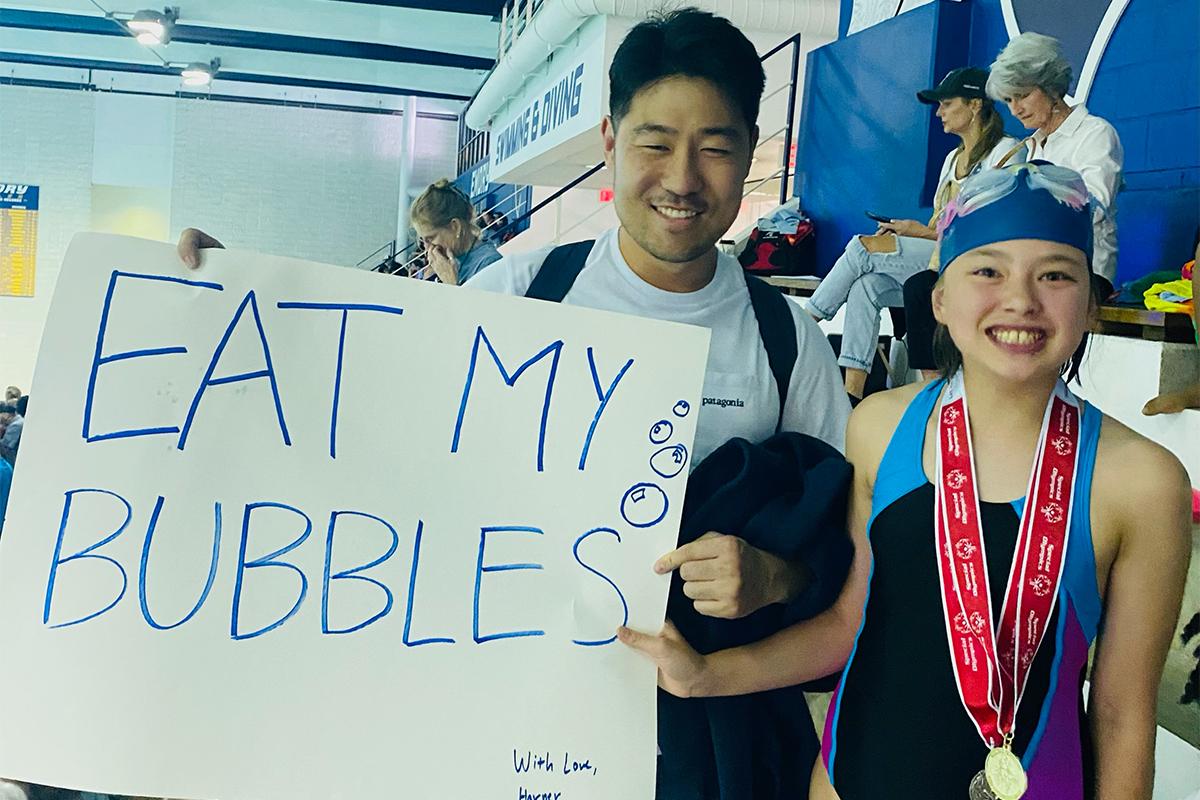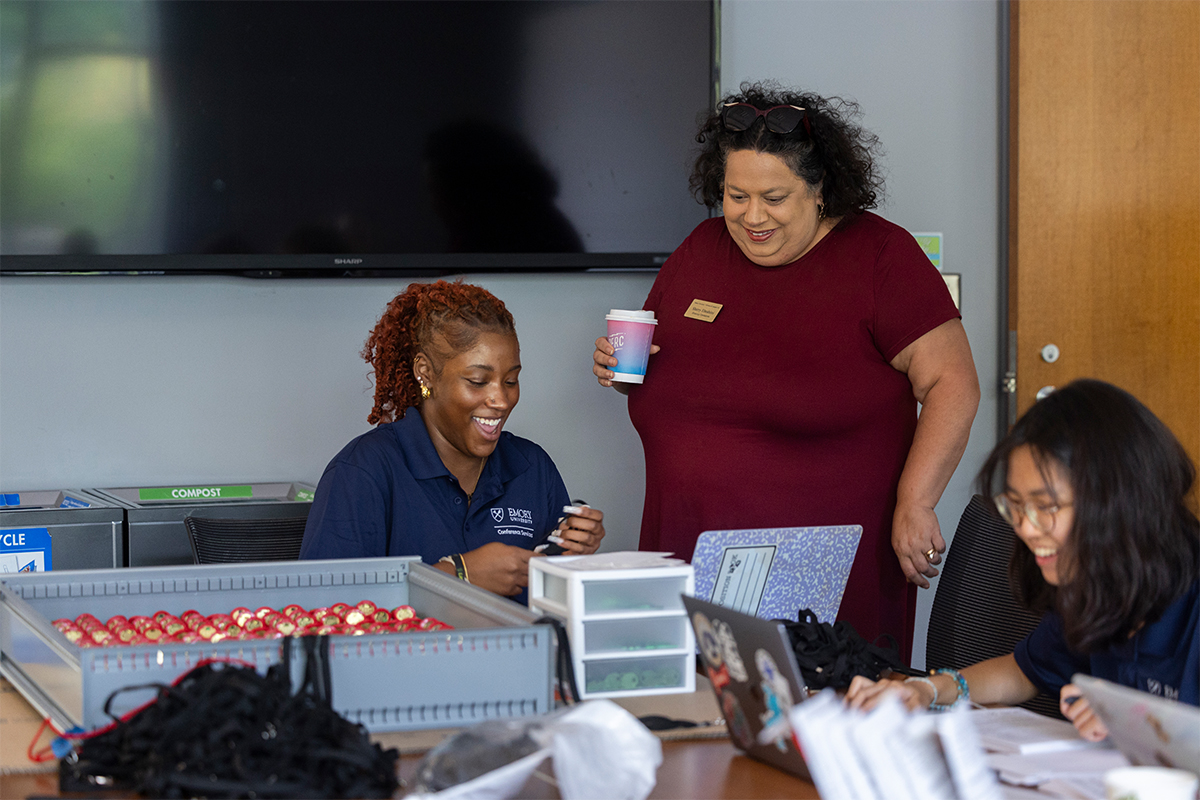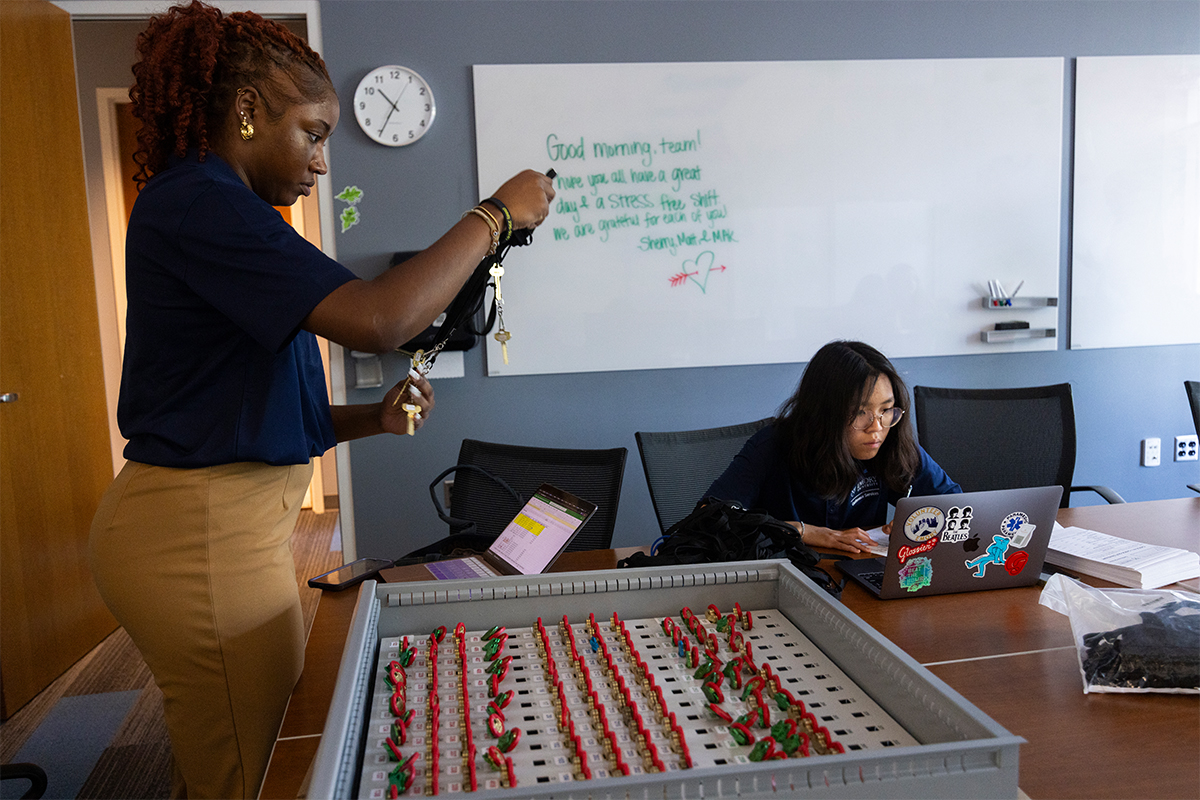Even now, Sherry Ebrahimi has no trouble recalling the young man, though it has been a few years since his visit.
As the ten-year-old arrived in the lobby of Raoul Hall for Castle Chess Camp on the Emory campus, he threw his arms out and proclaimed, “My people!”
According to Ebrahimi, director of conference services and housing administration in Campus Life at Emory, that child’s expression of happiness and belonging is by no means unique.
For many young people who do a summer camp at Emory, they are “about to be immersed in the thing they are most passionate about, and they find it empowering to be on a college campus, many of them for the first time,” says Ebrahimi.
The welcome they receive is as warm as the summer temperatures. With a personal touch, Ebrahimi and her staff provide logistical support and services for the summer programs. In her words, “We are running a top-notch hospitality business in the best place possible — the Emory campus — from late May through Aug. 1 every year.”
It was Emory’s ability to house the gymnastics teams during the 1996 Summer Olympics that put it on the map as a provider of conference services. This year, some 30 youth-enrichment programs will take place, kicked off — as is the case every year — by Special Olympics Georgia, which brought approximately 1,200 kids to campus for the weekend of May 19 and “went off without a hitch,” notes Ebrahimi.
To do so takes the coordinated work of a small professional staff, augmented by skilled undergraduate and graduate students in the roles of fellows, managers and assistants. Fast on their feet and doing their utmost to be on top of every detail, they seamlessly weave together housing, dining services, meeting spaces, transportation, technology support and recreational services for their visitors, some of whom are associated with Emory organizations or faculty while others represent external groups.
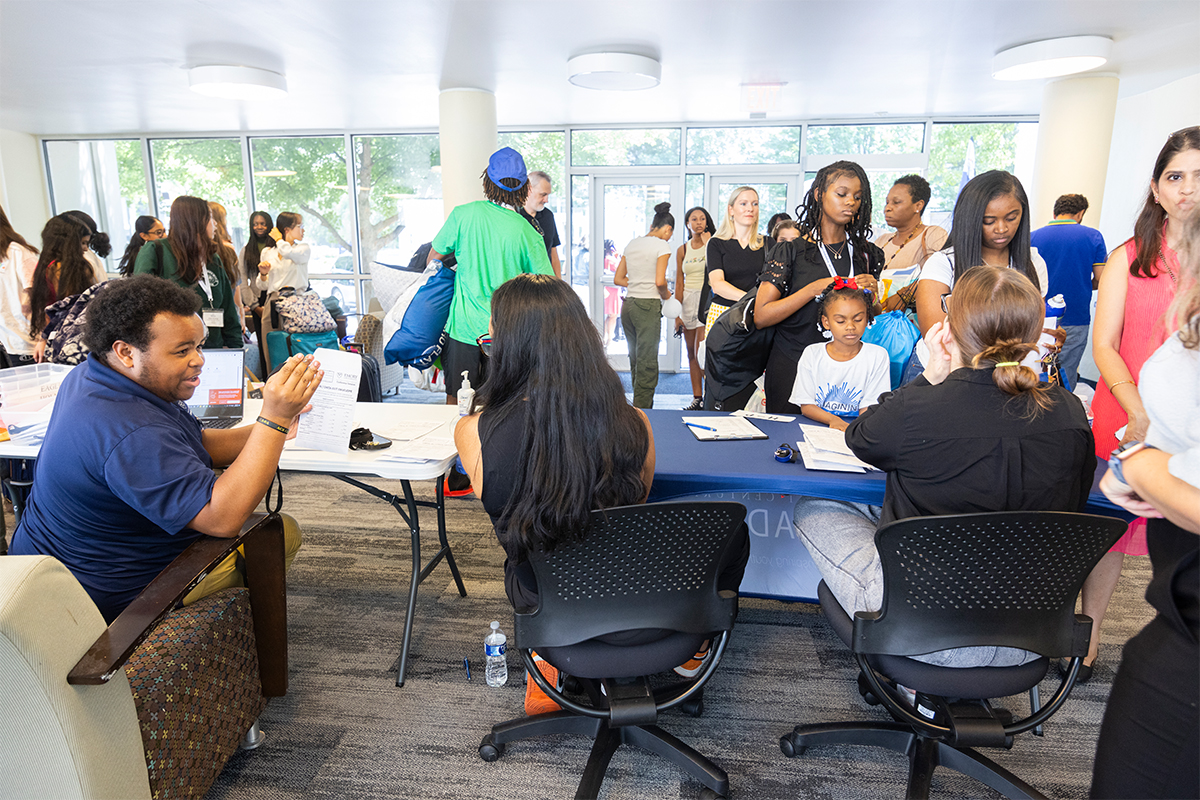
When moms, dads and kids arrive for a given camp, the staff is ready for an orderly check-in, no matter how many people or how many questions they pose.
Emory students make conference success possible
To deliver the best experience for guests during a demanding summer, Ebrahimi invests in one to two conference fellows, four managers and anywhere from 15 to 18 conference assistants.
The conference fellows — often current graduate students or recent graduates — live on campus, interact with onsite sponsors and guests, and supervise assistants as well as attending check-ins, serving as part of the 24/7 on-call rotation and communicating with numerous campus partners.
The managers, for their part, provide logistical support in various areas, including transportation, facilities and building services, meeting services and billing.
Each client is assigned one conference assistant — an undergraduate student — in May as their dedicated contact. They manage that conference’s check-in and check-out, prepare conference bills, staff hall concierge desks and join the on-call rotation.
Annabelle Phan graduated from Emory College of Arts and Sciences this year, having majored in chemistry and minored in Korean. Last year, she was a conference assistant; this year, she is learning the ropes as a manager.
“I specialize in specific areas to help our clients plan their stay at Emory most effectively,” Phan says. She will secure meeting-space reservations, liaise with Transportation and Parking Services, coordinate with staging and help set up technology.
Phan cites client satisfaction as a rewarding part of the job and also takes “a lot of joy in coordinating with my colleagues from Conference Services and related departments. We share a common goal to do our best to help each other achieve the best outcome. My job as a manager has linked me with people whom I would have never met otherwise, and I find that very worthwhile.”
Phan recalls last year helping a client who had forgotten his key when leaving his room. But it was hardly usual circumstances to reunite him with his key. In pouring rain, Phan “sprinted across campus, frazzled and a bit winded. When I finally reached the residence hall, the guest was thankful to regain entry to his room. I was relieved to be able to help someone get to sleep amid the drama of a storm.”
Plant yourself at Emory
Just some of the Emory groups that have an annual presence as part of the summer lineup include Barkley Forum (June 4-17), the Precollege Program (hosts three sessions between June 18 and July 29) and Youth Theological Initiative (July 8-15).
One faculty member particularly grateful for this resource is Cassandra Quave, associate professor of dermatology and human health as well as curator of the Herbarium. She hosted the joint conference (June 6-9) of the Society for Economic Botany and Society of Ethnobiology here. An international conference, it brought 254 delegates to campus, plus another 65 on a virtual portal, to discuss the interconnectivities between human and planetary health.
“I am deeply grateful for the contributions of Emory University Conference Services and the Atlanta Botanical Gardens for logistical support,” Quave says. “I was proud to welcome the delegates to Atlanta and to showcase Emory as a major hub for health research.”
Bright horizons for Native American students
In partnership with College Horizons (July 6-14), which addresses the education gap for Native American young people, Emory will welcome more than 100 Native American, Alaska Native and Native Hawaiian high school students for a week-long precollege program.
According to Beth Michel, who is leading planning for Emory’s Office of Undergraduate Admission, “We are excited to support this important program, which provides increased knowledge about the college admission process for Native American students and families.” Michel, senior associate dean of admission, is proof that the program works; she was part of the College Horizons inaugural class of 1998.
Students will reside in Raoul Hall; workshops will take place in Emory College classrooms; and Malinda Maynor Lowery, Cahoon Family Professor of American History and member of the Lumbee Tribe of North Carolina, will lecture. The staff of the Emory admission and financial aid offices will offer information sessions.
According to Ebrahimi, though business is not quite back to prepandemic levels, it is brisk. Some 80% of guests repeat year to year, while others return according to preset schedules.
Below are some of the groups packing their suitcases even now.
Developing leaders
21st Century Leaders (June 4-9): A nonprofit with a leadership focus, it inspires Georgia high school students “to leverage diversity, explore career opportunities and become leaders in their schools, communities and, ultimately, the workforce.” The relationship between 21st Century Leaders and Goizueta Business School goes back at least 17 years through two leadership and business-development programs: The Goizueta Youth Leadership Summit and the weeklong Summer Youth Leadership Institute at Goizueta, which wrapped up on June 9. Since 2007, the partnership has served more than 2,700 Georgia high school students.
C5 Georgia (July 11-15): This camp focuses on high-potential teens from under-resourced communities, helping to prepare them for leadership roles in college, work and their communities.
Pan-Africa Youth Leadership Program (July 15-19): Associated with the U.S. Department of State’s Bureau of Educational and Cultural Affairs, this youth-leadership program engages 150 high school students and adult mentors from more than 38 countries in Africa for a three-week, U.S.-based cultural exchange and civic engagement training program.
Making beautiful music
The Atlanta Chamber Music Festival (June 11-17) is for middle and high school students studying all orchestral instruments, jazz and piano. It is one of the few programs in the country with a chamber music focus for precollege students. Paul Bhasin, Emory’s director of orchestral studies, conducts the festival orchestras at the Schwartz Center for Performing Arts.
Two instruments slated to be in generous evidence on campus this summer will be the bassoon and euphonium, both of which have their own camps.
Let the games continue
Beyond the start to competition that Special Olympics Georgia provided, there will be two basketball camps and one for lacrosse, as well as Play by Play (July 17-21) — a longtime client — which gives sports enthusiasts who prefer to demonstrate their prowess behind a microphone many options, including creating sports anchor and sideline reporting videos.
Here’s to a summer without cranes
Whether it’s finding your equal in chess, exploring STEM or a medical career, demonstrating your knowledge of classics through the National Junior Classical League’s (July 21-27) quiz bowl or learning to make movies through Camp Flix (hosts two sessions between June 18 and July 15), guests come to “work hard and play hard,” says Ebrahimi.
A realist, she assumes that, given the many moving parts (and guests), there will be the occasional glitch. One year as guests were arriving for their camp, a crane blocked the door to their residence hall. As Ebrahimi notes, “It is not a question of if something goes wrong; instead, it’s how we handle it.”
Her reward comes in two parts. First, the work itself.
“I love collaborating with our students, and I especially relish giving our visitors an unforgettable experience. Some of them will come back to Emory as students, already crazy about the place in part because of our efforts,” Ebrahimi says.
Second, vacationing with her family — “her people” — when the summer guests depart.
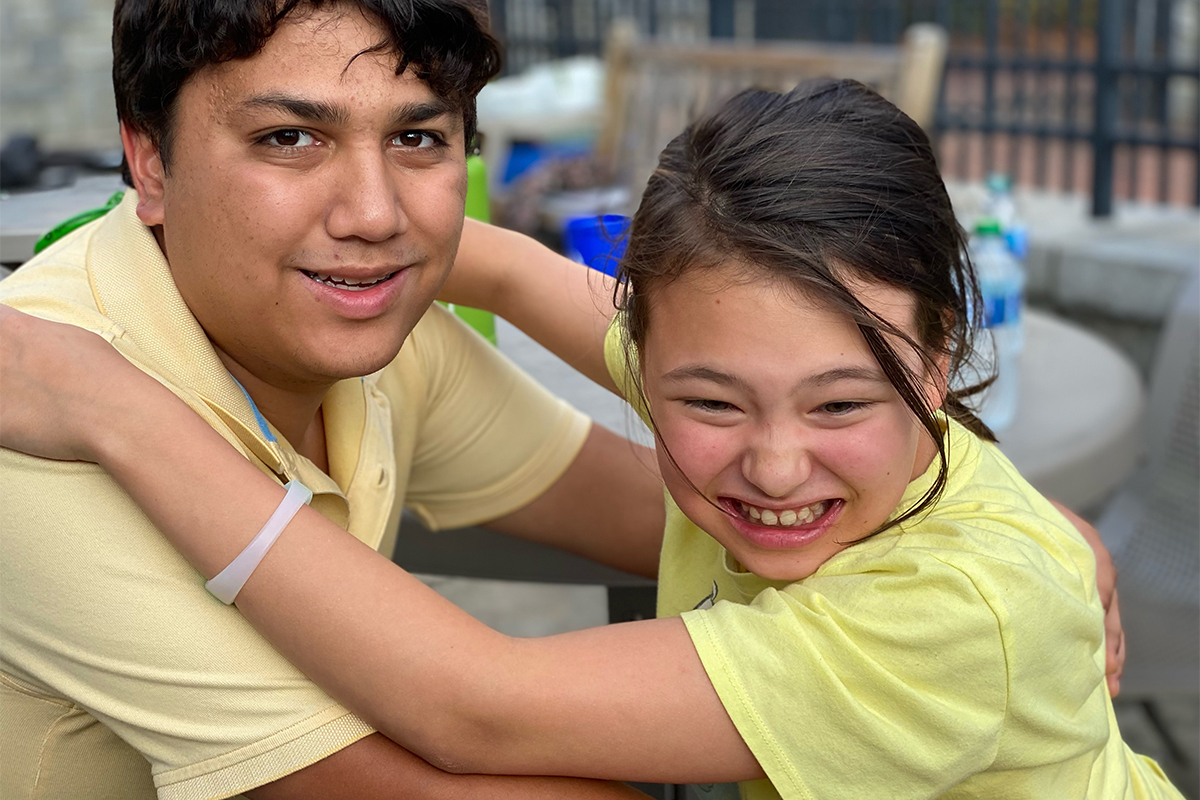
Evan (left, son of conference services director Sherry Ebrahimi) and Harper (Goizueta faculty member Wes Longhofer’s daughter) swam together on the Decatur Sea Dragons team as part of Special Olympics Georgia.

